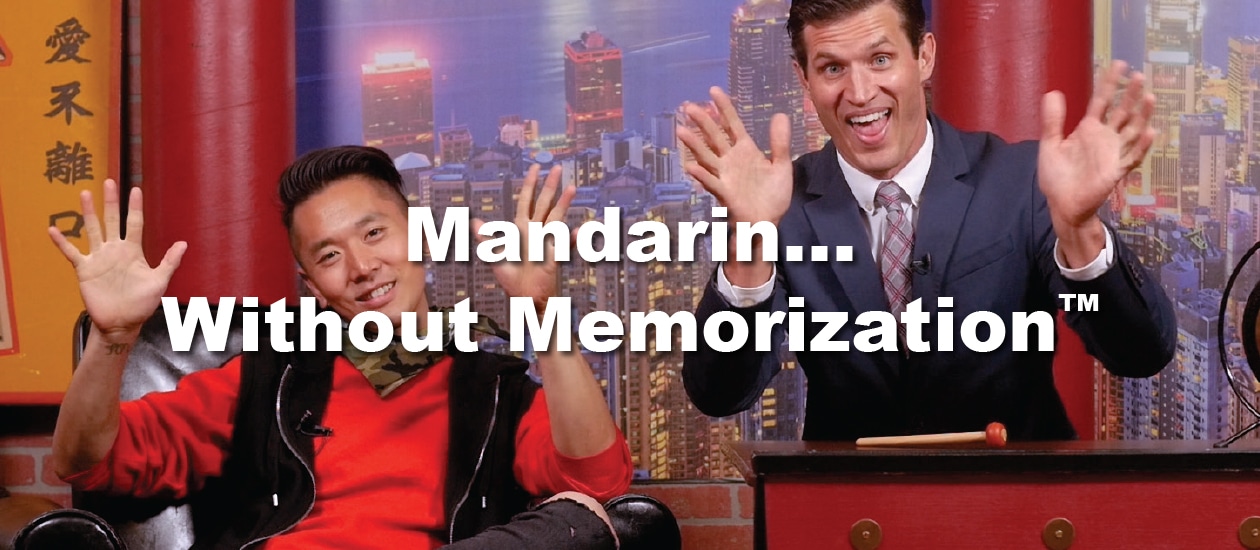Why 99% of Americans Struggle to Learn Mandarin Chinese. Plus, the 10 Secrets of the 1% That Succeed.
Learning a new language can be a daunting task. However, learning Mandarin Chinese is the exception: it’s even more challenging! It’s an established fact that Mandarin Chinese is an exceedingly difficult language to learn. This is especially true if you are employing conventional language learning methodologies. With its complex characters, tonal nature, and vast vocabulary, Mandarin poses unique challenges for English speakers. And meeting this challenge requires an equally unique solution.
There is a significant percentage of Americans find it difficult to learn Mandarin Chinese. And we will show you how you can be part of the 1% that actually succeeds, by experiencing a new way of learning Mandarin… simply by watching The Mandarin Show.
Why Americans Struggle
Despite the rising interest in learning Mandarin, American learners often find themselves grappling with a multitude of challenges. The vast chasm between the English and Chinese linguistic systems, combined with an unfamiliar cultural context, can make mastering Mandarin a formidable endeavor. The complexities of Mandarin’s tonal nature, the intricacies of its written characters, and the sheer volume of vocabulary present a steep learning curve for Americans, many of whom are monolingual English speakers.
One of the primary reasons why Mandarin is considered difficult for Americans to learn is the stark contrast between the two languages. English is an Indo-European language with a largely alphabetic writing system, while Mandarin Chinese is a Sino-Tibetan language with a logographic script consisting of thousands of characters.
#1: Logographic Writing System
The Chinese writing system relies on characters, each representing a word or morpheme, which is a fundamental unit of meaning in a language. Learning thousands of characters can be intimidating and time-consuming, making Mandarin a formidable language to master. This contrasts with the alphabet-based English system and it can make Mandarin seem almost inaccessible.
Secret Hack #1: What if 90% of Mandarin Chinese characters were actually symbols that you already recognize? Example: The symbol for “person” actually looks like a person running. Not only that, the pronunciation of the character even sounds a lot like our English word “run.”
#2: Tonal Nature
Mandarin is a tonal language, meaning that the pitch or tone used when pronouncing a word can change its meaning entirely. There are four tones in Mandarin, and using the wrong tone can lead to misunderstandings. For English speakers who are not accustomed to this tonal aspect, it adds another layer of complexity.
Secret hack #2: What if you could “absorb” tonal differences rather than memorizing them for each word?
#3: Lack of Cognates
Cognates are words in different languages that share a common origin and are similar in form and meaning. English shares many cognates with languages like Spanish, French and German due to their common Indo-European ancestry. However, Mandarin is not an Indo-European language, and it has almost no cognates with English. This means that learners cannot rely on pre-existing linguistic similarities to ease the learning process.
Secret hack #3: What if 95% of Mandarin words included “hidden cognates?”
Cultural and societal factors also play a significant role in the difficulties Americans face when learning Mandarin. There is a substantial cultural distance between the U.S. and China, with differences in customs, societal norms, and ways of thinking. These differences can make the language’s contextual nuances difficult to grasp, adding to the already complex grammatical and syntactic structures.
Secret hack #4: Mandarin grammar may be different, but it’s much simpler than English.
#5: Limited Exposure
Unlike European languages that have a considerable presence in American culture and education, Mandarin Chinese is relatively less exposed. This lack of exposure makes it harder for learners to find opportunities for immersive experiences and practice, which are crucial for language acquisition.
Secret hack #5: What if you could get tons of Mandarin language exposure by watching episodes of “mnemonic entertainment” that connect Mandarin words directly to English?
#6: Time and Effort Required
Learning any language demands a significant investment of time and effort. Due to the linguistic and cultural differences between English and Mandarin, mastering the latter typically requires more time and dedication. Most Americans may find it challenging to allocate such resources, given the demands of daily life.
Secret hack #6: What if using a “mnemonic entertainment” system like The Mandarin Show actually reduced the time required to learn Mandarin?
#7: Cultural Differences
Language is deeply intertwined with culture, and Mandarin reflects the unique culture of China. Understanding the cultural nuances and context of Mandarin can be challenging for American learners. For instance, Mandarin employs honorifics and formalities that may not have direct equivalents in English.
Secret hack #7: What if the sense of humor embedded in Mandarin Chinese, like comic timing, and slapstick, etc. translates easily to Western cultures?
#8: Education System
The American education system tends to prioritize European languages such as Spanish, French, and German. While some schools and universities offer Mandarin courses, they may not be as widely available or emphasized. The lack of Mandarin instruction at an early age can hinder proficiency development.
Secret hack #8: What if you could use English-to-English connections, considered the “ultimate cognate” in order to learn Mandarin?
#9: Motivation and Perceived Difficulty
The perception of Mandarin as a difficult language can discourage potential learners. The fear of investing time and energy into a language that seems insurmountable can deter many Americans from even attempting to learn it. In contrast, languages perceived as easier may attract more learners.
Secret hack #9: What if a system of language entertainment made learning Mandarin more fun than learning other languages?
#10: Lack of Immediate Practicality
For many Americans, the practicality of learning Mandarin may be limited compared to languages like Spanish or French, which have a wider global presence. Unless one has a specific need or interest in China-related business or culture, the perceived usefulness of Mandarin may not outweigh the challenges.
Secret hack #10: As the entertainment industry has exploded in China, and more Chinese immigration occurs in Western countries, there are now more opportunities than ever to use your knowledge of Mandarin Chinese, without going to China.
How The Mandarin Show Can Help
The Mandarin Show wasn’t designed to make learning Mandarin a little bit easier. It was created to completely transform the entire experience of learning Mandarin Chinese.
Here’s how The Mandarin Show helps you become part of the 1% who succeed with Mandarin:
- The Mandarin Show looks like, and sounds like a late night talk show.
- You learn Mandarin words without memorizing… and memorizing…and memorizing.
- Mandarin words are connected to English through fun and easy mental links.
- These mental links are performed using a new form of “mnemonic entertainment.”
- 500 episodes of “mnemonic entertainment” builds thousands of words in Mandarin.
- Additional content such as a cooking show and sitcoms expand your vocabulary.
- Content is presented in both English and Mandarin, so you always have a life raft.
- You absorb proper use of Mandarin tones through comedy sketches, not lectures.
- Simplified grammar is presented as part of the entertainment, vs. boring instruction.
- All Mandarin entertainment is sequentially structured in an easy, step-by-step process.
- You learn Mandarin faster, without memorization, with guests, gags, music and comedy.
- Native Chinese performers expose you to the customs and culture of China.
“Beating” the Statistics is as Easy as “Pie”
Watch any of the 500 episodes of The Mandarin Show and you’ll immediately see how easy it can be to learn Mandarin … without memorization. For example, check out the famous “BEAT-a-PIE” comedy sketch on Episode #152.
Watch as comedian Andy Peake, the host of the show, and his side-kick “Confucius D” (actor Jason Jiang) actually “BEAT a PIE” over and over again. Why? Because when you say “pie” in Mandarin, it means to “beat” something. It’s that easy to learn Mandarin. (Note: In the Mandarin system, the sound we know as“pie” is written as “pai.”)
Since The Mandarin Show premiered, it is now no longer accurate to claim that 99% of Americans can’t learn Mandarin. It is still true that learning Mandarin Chinese presents significant challenges for English speakers due to its linguistic differences, lack of cognates, cultural factors, and the education system’s priorities. However, The Mandarin Show has beaten these challenges through the world’s only system of “mnemonic entertainment.”
If you want to “beat” the statistics, it’s as easy as “pie” with The Mandarin Show.


